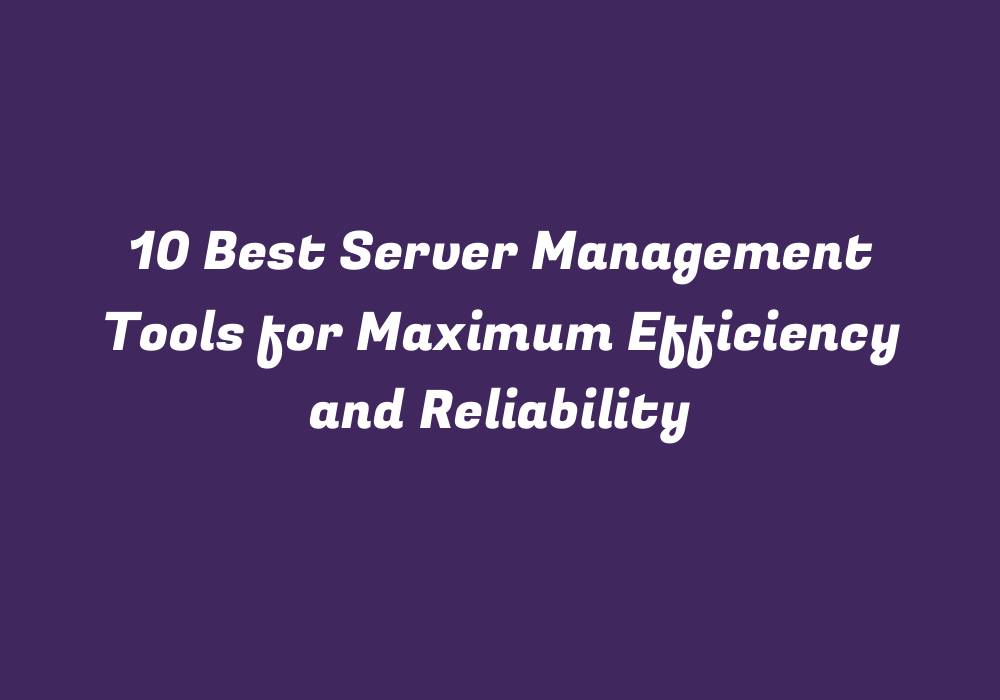Introduction to Server Management Tools
A well-managed server is crucial for a website’s performance, security, and efficiency. The right tools can help administrators keep everything running smoothly, ensuring that users have an optimal experience on their favorite websites. In this article, we will explore the top 10 server management tools that promise maximum efficiency and reliability.
1. CPanel
CPanel is a widely popular control panel for managing web hosting accounts, offering an intuitive interface that streamlines various tasks such as file management, email configuration, database administration, and more. Its user-friendly design makes it suitable even for beginners to handle server operations effectively.
2. Plesk
Plesk is another well-known web host control panel that enables easy management of a server’s configuration, applications, and security settings from one central location. The platform is compatible with Windows and Linux servers, supporting multiple programming languages and databases for maximum flexibility.
3. DirectAdmin
DirectAdmin is a feature-packed open-source web hosting control panel offering a comprehensive suite of tools to manage your server effectively. It has been praised for its clean and intuitive user interface, making it accessible even for users with minimal technical backgrounds.
4. cPanel Alternative: Webmin
Webmin is a web-based GUI that simplifies server administration tasks, allowing you to manage various aspects of your system from any device with a browser. It supports multiple servers and operating systems, making it an ideal alternative to the traditional cPanel.
5. Monitoring Tools: Nagios Core
Nagios Core is a powerful open-source server monitoring tool designed to monitor your infrastructure for potential issues and send alerts when problems occur. By closely tracking server health, you can identify and address issues before they impact your users’ experience.
6. Server Configuration: Puppet
Puppet is an open-source configuration management tool that helps maintain consistent configurations across multiple servers. It automates the process of installing, updating, and managing your server’s software, ensuring maximum efficiency and reliability.
7. Automation Tools: Ansible
Ansible is a popular open-source IT automation tool that can be used for orchestrating complex tasks across multiple servers, including provisioning, configuration management, and application deployment. Its simple yet effective approach to automation simplifies routine server maintenance.
8. Application Deployment: Kubernetes
Kubernetes is a widely adopted container orchestration tool used for deploying, managing, and scaling applications in containers across multiple servers. By utilizing this platform, you can create self-healing systems that automate resource allocation for improved efficiency and reliability.
9. Infrastructure Automation: SaltStack
SaltStack is a powerful configuration management tool that focuses on infrastructure automation. It allows you to manage various aspects of your server’s environment, such as system updates and application deployment, from one central point for enhanced efficiency and reliability.
10. Server Security: OSSEC
OSSEC is a comprehensive open-source security tool that provides real-time monitoring of your server’s activity, detecting any suspicious behavior to ensure the safety of your system and users. By utilizing this software, you can effectively guard against potential threats while maintaining optimal performance.
Conclusion
Selecting the right server management tools is crucial for guaranteeing maximum efficiency and reliability in your website’s operations. The aforementioned tools cater to various aspects of server management, from user interfaces to infrastructure automation. By choosing from this comprehensive list, you can optimize your server performance and provide an exceptional experience for your users.
References
1. CPanel
2. Plesk
3. DirectAdmin
4. Webmin
5. Nagios Core
6. Puppet
7. Ansible
8. Kubernetes
9. SaltStack
10. OSSEC
